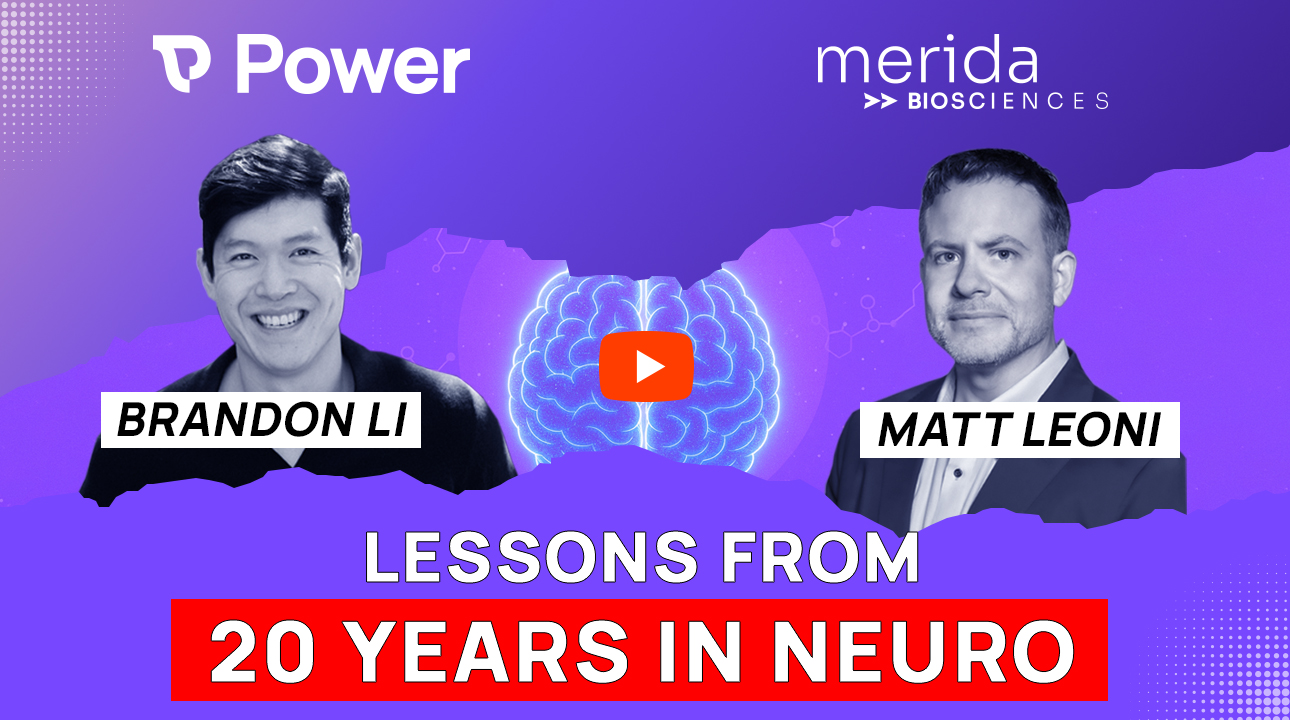🧠 Navigating the Complex World of Neuro Drug Development
Challenges, Innovations & the Future of Neuroscience | Power to the Patients Podcast
🎙️ Guest: Matthew Leoni, CMO, Merida Biosciences
“You have to respect the drug gods — they can be cruel. You need humility and an awareness of what you don’t know when designing trials.”
👋 Episode Overview
In this episode, Matt Leoni, former SVP of Global Clinical Development at Cerevel and current CMO at Merida Biosciences, shares insights from his 17+ years in the industry. Drawing from leadership roles at Cerevel, Otsuka, Novartis, and others, Matt reflects on the challenges unique to neuro drug development, the tension between innovation and risk-aversion, and why he’s optimistic about disease-modifying therapies.
🧭 Top Takeaways
✅ Neuro trials face unique headwinds: subjective endpoints, placebo effects, and operational variance.
✅ Incremental improvements matter, but real transformation needs better measures and willingness to take risks.
✅ Disease-modifying therapies — aided by AI, genetic targeting, and multimodal approaches — could change the landscape.
🔑 Key Topics Covered
1. Guest Background
- MD/MBA from University of Pennsylvania; trained in pathology before moving directly into industry.
- Career path through dermatology, immunology, MS, psychiatry, and neurology drug development.
- Leadership roles in both large pharma and biotech, including recent work in Parkinson’s, epilepsy, and schizophrenia.
2. The Problem They’re Solving
- Neuro has some of the highest trial failure rates due to subjective endpoints and placebo effects.
- Patient populations are saturated; repeated trial participation increases placebo response.
- Lack of sensitive, objective measures makes it hard to detect true drug effects.
3. Their Innovation or Contribution
- Advocating for alignment on new, more sensitive endpoints that still address patient relevance.
- Pushing for multi-modal approaches combining symptom relief, neuroinflammation targeting, and genetic insights.
- Encouraging earlier physician exposure to clinical trials to build pathways into industry.
4. Challenges & Barriers
- Regulatory and financial structures incentivize incremental improvements over radical innovation.
- Difficulty in retrofitting novel mechanisms into existing, accepted scoring systems (e.g., PANSS).
- Resistance to abandoning entrenched endpoints even when they have limitations.
5. Vision for the Future
- Disease-modifying therapies as the “holy grail” for neurodegenerative and psychiatric conditions.
- AI, CRISPR, and precision medicine to unlock deeper understanding of neural networks.
- Breakthroughs likely to start in oncology and rare diseases, then migrate to psychiatry.
💬 Speaker Spotlights
On the difficulty of neuro drug development:
“It’s one of the hardest things to do — you’re measuring how people feel, and that’s inherently variable.”
On trial design humility:
“You have to respect the drug gods… have humility and know what you don’t know.”
On innovation vs. incentives:
“We’re incentivized to chase what works rather than break the mold — it’s not what breeds the most innovation.”
On disease modification:
“We’re on the cusp of a new generation of drugs that could change the trajectory of disease.”
On psychoplastogens:
“If they can deliver the psychedelic horsepower without the trip, they could be our first real disease-modifying therapy in psychiatry.”
🎧 Listen to the Full Episode:
💡 Keep Exploring
- Subscribe to Power to the Patients
- Follow: Matthew Leoni on LinkedIn
- Related episodes:
- *Gerard Sanacora on Glutamate, GABA, and the Future of Interventional Psychiatry*
- *Dina Burkitbayeva on Building Mental Health Biotech Companies*
Subscribe to Power's Newsletter
Stay ahead with a new patient recruitment insight every week.




